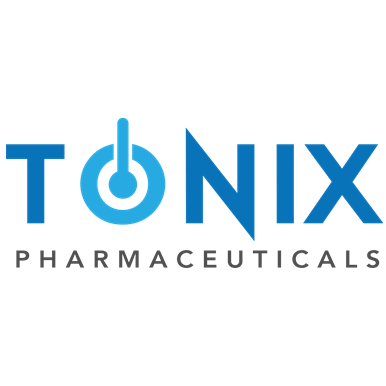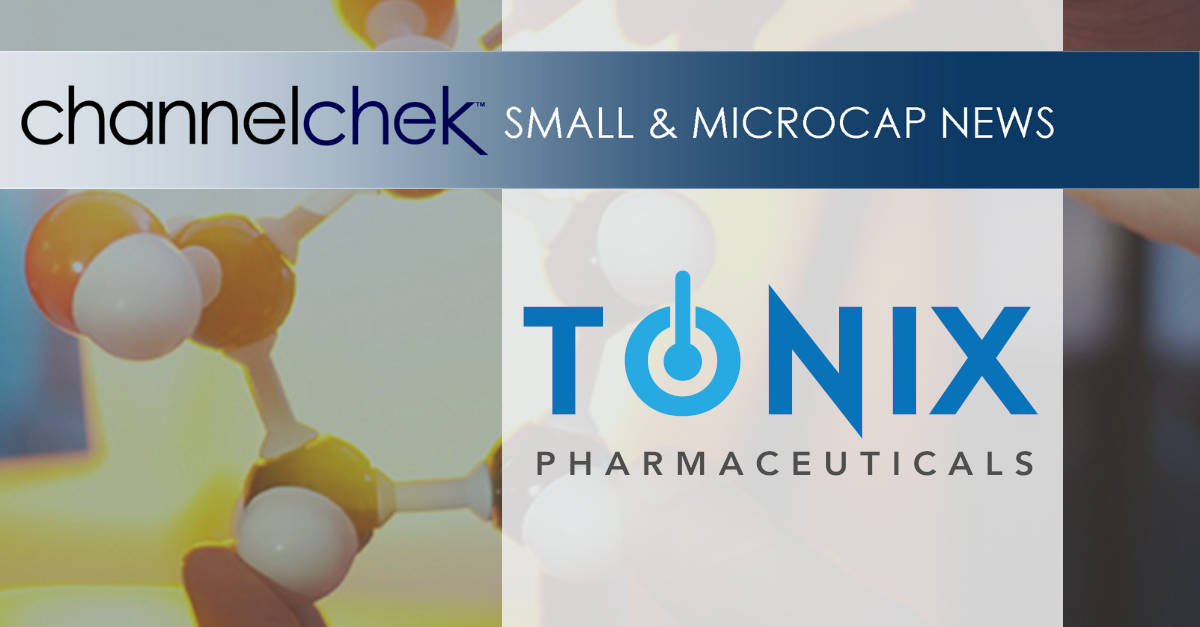
Research, News, and Market Data on TNXP
December 05, 2022 7:00am EST
Hematopoietic Stem Cell Transplantation (HCT) from Unrelated Donors is a Component of the Treatment Protocol for Several Hematologic Malignancies
GvHD Complicates Treatment and Limits the Success of Engraftment after HCT
In addition to GvHD, Tonix is Developing TNX-1500 for Prophylaxis of Organ Transplant Rejection and Treatment of Autoimmune Disorders
Phase 1 Study of TNX-1500 is Expected to Start in First Half 2023
CHATHAM, N.J., Dec. 05, 2022 (GLOBE NEWSWIRE) — Tonix Pharmaceuticals Holding Corp. (Nasdaq: TNXP) (Tonix or the Company), a clinical-stage biopharmaceutical company, today announced that it has entered into a sponsored research agreement with Boston Children’s Hospital to study TNX-15001 (Fc-modified anti-CD40L mAb) for the prevention of graft-versus-host disease (GvHD) after hematopoietic stem cell transplantation (HCT) in animals. The principal investigator is Leslie S. Kean M.D., Ph.D., Director, Stem Cell Transplantation Program, Division of Hematology/Oncology, Boston Children’s Hospital, Department of Pediatric Oncology, Dana-Farber Cancer Institute and Robert A. Stranahan Professor of Pediatrics, Harvard Medical School. The primary objective of the preclinical research study is to study the activity of TNX-1500 administered prophylactically to modify GvHD progression in animals after HCT to support an Investigational New Drug (IND) application for human studies. A Phase 1 study of TNX-1500 to assess pharmacokinetics and tolerability is expected to start in the first half of 2023.
“We are excited to work with Leslie Kean on studying the potential of TNX-1500 for preventing GvHD after HCT,” said Seth Lederman, M.D., Chief Executive Officer of Tonix Pharmaceuticals. “Stem cell transplantation is an essential component of the treatment of several blood cell or hematologic cancers, but GvHD remains the most deadly complication, and limits the success of this otherwise life-saving treatment. To date, there has not been a humanized anti-CD40L antibody that can effectively prevent transplant rejection or GvHD with acceptable levels of tolerability. TNX-1500 is a third generation anti-CD40L monoclonal antibody that has been designed by protein engineering to decrease FcγRII binding and to reduce the potential for thrombosis. We are excited to sponsor this study of testing anti-CD40L in HCT to potentially replace cyclophosphamide in the post-transplant setting. A positive result would potentially support an IND and human studies.”
Dr. Kean, the principal investigator of the sponsored research said, “GvHD remains one of the most severe complications associated with HCT. For myeloablative MHC-haploidentical HCT, the risk of GvHD is substantial, and with the most severe form of acute GvHD, as many as half of patients can die from this disease. For these high-risk transplants, there is no fully effective GvHD prevention strategy. I have studied first generation anti-CD40L antibodies previously and I’m excited to test the effects of Tonix’s Fc-modified anti-CD40L.”
Dr. Lederman continued, “The application that we envision is for post-HCT, when the GvHD-causing alloreactive T cells are at peak activation. This is the timing for post-transplant cyclophosphamide that has been shown to decrease chronic GvHD, allow for haplo-identical transplants and shorten the period of profound immunosuppression. In post-transplant cyclophosphamide therapy, the effect is targeted to the appropriate cells by the cell cycle of activated T cells. In CD40L therapy, we believe appropriate T cells may be targeted by the transient expression of CD40L. To be successful, the post-HCT indication requires prolonged engraftment. Anti-CD40L is already used in solid organ transplant tolerance models (and therapy) that only require transient chimerism.”
About TNX-1500
TNX-15001 (Fc-modified anti-CD40L mAb) is a humanized monoclonal antibody that interacts with the CD40-ligand (CD40L), which is also known as CD154. TNX-1500is being developed for the prevention of allograft and xenograft rejection, for the treatment of autoimmune diseases and for the prevention of graft-versus-host disease (GvHD) after hematopoietic stem cell transplantation (HCT). A Phase 1 study of TNX-1500 is expected to be initiated in the first half of 2023. TNX-1500 is a third generation anti-CD40L mAb that has been designed by protein engineering to decrease FcγRII binding and to reduce the potential for thrombosis. In June 2022, Tonix announced data from three oral presentations at the 2022 American Transplant Congress by faculty at the Center for Transplantation Sciences, Massachusetts General Hospital. The data involved studies of TNX-1500 in development for the prevention of organ transplant rejection. The animal studies found that TNX-1500 showed activity in preventing organ rejection and was well tolerated in non-human primates. Blockade of CD40L with TNX-1500 monotherapy consistently and safely prevented pathologic alloimmunity in non-human primate models of cardiac and kidney allograft transplantation without clinical thrombosis. Copies of the presentations are available under Scientific Presentations on the Tonix Pharmaceuticals corporate website at www.tonixpharma.com.
1TNX-1500 is a biologic at the pre-IND stage of development and has not been approved for any indication
Tonix Pharmaceuticals Holding Corp.*
Tonix is a clinical-stage biopharmaceutical company focused on discovering, licensing, acquiring and developing therapeutics to treat and prevent human disease and alleviate suffering. Tonix’s portfolio is composed of central nervous system (CNS), rare disease, immunology and infectious disease product candidates. Tonix’s CNS portfolio includes both small molecules and biologics to treat pain, neurologic, psychiatric and addiction conditions. Tonix’s lead CNS candidate, TNX-102 SL (cyclobenzaprine HCl sublingual tablet), is in mid-Phase 3 development for the management of fibromyalgia with a new Phase 3 study launched in the second quarter of 2022 and interim data expected in the second quarter of 2023. TNX-102 SL is also being developed to treat Long COVID, a chronic post-acute COVID-19 condition. Tonix initiated a Phase 2 study in Long COVID in the third quarter of 2022 and expects interim data in the second quarter of 2023. TNX-1300 (cocaine esterase) is a biologic designed to treat cocaine intoxication and has been granted Breakthrough Therapy designation by the FDA. A Phase 2 study of TNX-1300 is expected to be initiated in the first quarter of 2023. TNX-1900 (intranasal potentiated oxytocin), a small molecule in development for chronic migraine, is expected to enter the clinic with a Phase 2 study in the first quarter of 2023. TNX-601 ER (tianeptine hemioxalate extended-release tablets) is a once-daily formulation of tianeptine being developed as a potential treatment for major depressive disorder (MDD) with a Phase 2 study expected to be initiated in the first quarter of 2023. Tonix’s rare disease portfolio includes TNX-2900 (intranasal potentiated oxytocin) for the treatment of Prader-Willi syndrome. TNX-2900 has been granted Orphan Drug designation by the FDA. Tonix’s immunology portfolio includes biologics to address organ transplant rejection, autoimmunity and cancer, including TNX-1500, which is a humanized monoclonal antibody targeting CD40-ligand (CD40L or CD154) being developed for the prevention of allograft and xenograft rejection and for the treatment of autoimmune diseases. A Phase 1 study of TNX-1500 is expected to be initiated in the first half of 2023. Tonix’s infectious disease pipeline consists of a vaccine in development to prevent smallpox and monkeypox, next-generation vaccines to prevent COVID-19, and a platform to make fully human monoclonal antibodies to treat COVID-19. TNX-801, Tonix’s vaccine in development to prevent smallpox and monkeypox, also serves as the live virus vaccine platform or recombinant pox vaccine (RPV) platform for other infectious diseases. A Phase 1 study of TNX-801 is expected to be initiated in Kenya in the first half of 2023. Tonix’s lead vaccine candidate for COVID-19 is TNX-1850, a live virus vaccines based on Tonix’s recombinant pox live virus vector vaccine platform.
*All of Tonix’s product candidates are investigational new drugs or biologics and have not been approved for any indication.
This press release and further information about Tonix can be found at www.tonixpharma.com.
Forward Looking Statements
Certain statements in this press release are forward-looking within the meaning of the Private Securities Litigation Reform Act of 1995. These statements may be identified by the use of forward-looking words such as “anticipate,” “believe,” “forecast,” “estimate,” “expect,” and “intend,” among others. These forward-looking statements are based on Tonix’s current expectations and actual results could differ materially. There are a number of factors that could cause actual events to differ materially from those indicated by such forward-looking statements. These factors include, but are not limited to, risks related to the failure to obtain FDA clearances or approvals and noncompliance with FDA regulations; delays and uncertainties caused by the global COVID-19 pandemic; risks related to the timing and progress of clinical development of our product candidates; our need for additional financing; uncertainties of patent protection and litigation; uncertainties of government or third party payor reimbursement; limited research and development efforts and dependence upon third parties; and substantial competition. As with any pharmaceutical under development, there are significant risks in the development, regulatory approval and commercialization of new products. Tonix does not undertake an obligation to update or revise any forward-looking statement. Investors should read the risk factors set forth in the Annual Report on Form 10-K for the year ended December 31, 2021, as filed with the Securities and Exchange Commission (the “SEC”) on March 14, 2022, and periodic reports filed with the SEC on or after the date thereof. All of Tonix’s forward-looking statements are expressly qualified by all such risk factors and other cautionary statements. The information set forth herein speaks only as of the date thereof.
Contacts
Jessica Morris (corporate)
Tonix Pharmaceuticals
investor.relations@tonixpharma.com
(862) 904-8182
Olipriya Das, Ph.D. (media)
Russo Partners
Olipriya.Das@russopartnersllc.com
(646) 942-5588
Peter Vozzo (investors)
ICR Westwicke
peter.vozzo@westwicke.com
(443) 213-0505
Source: Tonix Pharmaceuticals Holding Corp.
Released December 5, 2022
